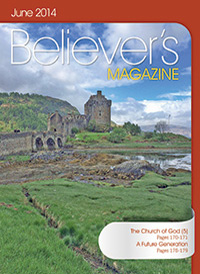When he wrote his letter to the assembly in Colosse, a city which was situated about one hundred miles from Ephesus, Paul had never visited the saints there. One Colossian believer, Epaphras, who was in Rome when the epistle to the Colossians was written (4.12), had been closely involved in the work of planting the local church. The purpose of the letter is to warn the saints of the error in teaching pseudo-religion, which had a prominent place in Colossian society. To counter this Paul teaches the truth that is beneficial to all believers. In so doing beautiful truth is unfolded regarding the Lord Jesus, as encouraging today as it was when first put to the pen.
There is the danger of Christians, thankful that their destination is heaven and that their sins have been forgiven, feeling that this is as far as the believer has to go. Let us look for a few moments at the exhortation to have deeper understanding of some of the great truths concerning the Lord Jesus Christ.
First, "it pleased the Father that in him should all fullness dwell" (1.19). "In him" refers to the Lord Jesus. Other texts, such as that of JND, have it "in him all the fullness of the Godhead was pleased to dwell". How glorious this is! Lightfoot states, "The totality of the divine attributes were pleased to dwell in Him"; and "As He is first with respect to the universe, so it was ordained that He should become first with respect to the Church as well". Let us enjoy often our consideration of such wondrous greatness as we appreciate the fullness of the Lord Jesus, not forgetting that He who also knows us, loves us and cares for us individually.
Second, "In whom are hid all the treasures of wisdom and knowledge" (2.3). What a treasure trove this is! All, not just some, of these gems are found in Christ, and therefore to seek them elsewhere is folly. Such wisdom and knowledge does not lie on the surface but must be sought as hidden treasure. In a world where there is a multitude of religions, views, science and ideas the wise ensure that their understanding and thoughts are based on the Word of God. All knowledge is comprehended in Christ.
Third, "As ye have therefore received Christ Jesus the Lord, so walk ye in him: Rooted and built up in him" (2.6-7). The grammar used by Paul indicates that we should go on walking in Him, stable at all times. This he qualifies clearly in v.7. We must be "rooted", as a tree; "built", as a building being constructed; and "stablished", to be stable and remain strong despite the power of outside forces. In Colosse the powers working against the gospel sought to assault those who were Christians, just as such opposition does today. Let the Christian keep heart and mind on the Lord as the enemy seeks to attack. To walk in Him indicates the manner of life which is practised by those who have come to know Him. The claim to be a believer is doubtful should the manner of life fail constantly to be in line with the teaching of Scripture.
Fourth, "For in him dwelleth all the fullness of the Godhead bodily" (2.9). The first thing to notice is that the verse quoted at the head of this page seems almost identical to the verse above. But there is a difference. This verse, stating that all fullness dwells "in him", indicates that that fullness does so "bodily" as one whole. The fullness of the Godhead dwells in Christ and never will be diluted, deleted or partially removed. The totality of divine powers and attributes are in Christ who ensures that we have the satisfaction of every spiritual need.
Fifth, the following verse continues in this theme, "Ye are complete in him" (v.10). This is in the passive voice. We have had no part in the doing of this, it was all carried out for us. No other source is required and no other can take part in bringing this to its gaol.
How wondrous is the gospel and how great the work of the One who died and rose again. Let us continue considering Him who gave Himself so that eternal enjoyment of Him can continue, never to be taken from us.









